|
Welcome to Secrets of Organ Playing Podcast episode 578!
Ms. Keller's extensive church music experience includes work in with volunteer and professional choirs and instrumental ensembles devoted to the highest level of music for worship. She is devoted to the development of amateur and volunteer choristers and musicians of every age level. Ms. Keller has created organ and choral scholar programs at small to mid size parishes, developed successful children's choir programs, and led choirs on tour including a residency at Bristol Cathedral in the UK in the summer of 2011 with concerts at Bath Abbey and Canterbury Cathedral.
In April of 2011 Ms. Keller won first prize in the North American round of the Michael Tariverdiev International Organ Competition, earning a place in the second round in Kaliningrad, Russia in September. In Kaliningrad she was awarded the Special Shabyt Prize from the Kazakh National University of Arts in Astana, Kazakhstan for “the most promising organist for inspiration and luck” which included a recital in Astana and a CD recording. In August of 2010 Ms. Keller was an instructor in the Internationale Orgelakademie at St. Stephan’s Cathedral in Passau, Germany. The course focused on American and English organ music and included students from several countries in Europe. In conjunction with the course, she played a recital at St. Stephan’s Cathedral and at the Church of St. Peter and St. Paul in Waldkirchen with Dr. Horst Buchholz, Director of Music at the Cathedral Basilica of St. Louis. Ms. Keller received the Performer’s Certificate and the Master of Music Degree in Organ Performance and Literature at the Eastman School of Music in Rochester, New York under the tutelage of David Higgs. While at Eastman, she studied continuo with Arthur Haas and improvisation with Dr. Gerre Hancock. She received the Bachelor of Music Degree in Piano Performance from the Baldwin Wallace Conservatory of Music in Berea, Ohio, studying piano with George Cherry and Jean Stell and organ with Margaret Scharf. In this conversation Nicole shares her insights about the importance of listening to a lot of other music besides organ. Listen to the conversation Relevant Link: http://www.nicolekeller.com
Comments
Vidas: Hi guys! This is Vidas.
Ausra: And Ausra. V: Let’s start episode 574 of Secrets of Organ Playing Podcast. This question was sent by Ruth. And she wrote an answer in return of my question in Total Organist community: How do you like Total Organist so far? And she wrote, In Total Organist I am learning a lot, from reading of the experiences of organists around the world. I appreciate the opportunity to ask questions of them and also to listen to recordings of some of them. V: Hm. Do you think, Ausra, that Ruth is referring to recordings of our Secrets of Organ Playing Contest, or what is she talking about? A: I’m a little bit misunderstood her question. Because I don’t know, what do you think about it? V: Sometimes organists who participate in our contests, like Jeremy Owens or James Flores, they publish links to their posts so that people could read their posts and listen to their contest entries. Maybe that is what Ruth is referring to. A: Could be. Of course, I think in general that it’s probably the most beneficial for any person, well, to practice more, and to spend more time at the keyboard, rather than reading or listening about what other people are doing. Don’t you think so? V: Yes, but you can augment that. Because when you are alone practicing, it’s just one thing, yes, you are practicing for your own enjoyment. But when you know that other people are doing it at the same time, and reporting their experiences, this is very powerful motivator, I think. A: Yes, but I think nowadays there is a danger of, sort of develop an addiction to social networks. V: What I mean - obviously you’re right - but what I mean is, for example this morning, James Flores recorded chorale prelude from Orgelbuchlein by Bach, Christ lag in Todesbanden. And I listened to his recording, and I got inspired to create my own chorale prelude based on this tune. If he hadn’t published this, if I hadn’t come across to this recording, then I might have missed the chance of creating. I’m not saying I will create it, or I have created in the past, but I am already thinking about it, and James has been the catalyst of this. A: But do you think everybody who will listen to that recording will feel the same way and will start to compose something or create something? V: You mean to James’ recording or my recording? A: To James’ recording, let’s say. V: No, no. A: Because you haven’t created on that tune yet. V: Yes, I mean, for everyone it’s different. They take what is inspiring for them, what their goals are. Not everyone is a creator yet, right? Some people are performers. And if they listen to Orgelbuchlein prelude like this, they might get inspired to perform it, to practice. The same piece, you know. A: Well, I wouldn’t agree with you that performers aren’t creators. I think we are creators. Because what we are creating, we are creating our own interpretations of the given piece. Because you can take the same piece and let’s say, 101 organists would record it, and everybody would play a little bit different. V: Of course you are a creator, I didn’t mean that. A: No, I didn’t took it personally, so, I didn’t take it personally. But you know what I mean. V: And you know what I mean. A: Yes. V: We know what we mean in our minds, so we basically don’t say it out loud, but people who are listening to this might understand something from this conversation that I mean, if you are creating your own music, that’s a different thing than you are interpreting somebody else’s, you know. A: Yes. You know, what I’m trying to tell, that there are sort of group of people who really want to participate in this organ life. V: Mm hm. A: And who attend every single recital in the area. V: Uh huh. A: But, you know, and they pretend that they know about organ a lot. V: Discuss things. A: Discuss things. But you know, if you ask them to sit down at a keyboard, they can barely play a scale for you. V: Mm hm. A: That’s what I’m talking about. Instead of, not wasting your time, but spending too much of your time listen to other organists, or other recitalists, you need to do something for yourself and sit on the organ bench and practice. V: This is why I always advise to do creative activity first thing in the morning, whatever it means for you. This morning for me, it meant that I had to create a performance of my Opus 1, Veni Creator Spiritus, on the keyboard that I have upstairs in my room. So, instead of surfing social media let’s say, listening to a lot of other people’s music - although, I listened to James’ performance first, I have to admit. But it was just for 2 minutes (laugh). You know what 2 minutes means for me. A: Yes, it’s at least 20 minutes, but it’s okay. V: Yeah, but I got up at 5 a.m., so…. A: Well so in this case, I am just feel so hopeless. Because most of my mornings, the first thing in the morning, what I do is to prepare a breakfast for you and myself. V: That’s a… A: And then I just go to school. V: But that’s later, that’s at 6:00 sometimes, right? A: Yes, that’s right. V: On a, or weekends, like at 8:00. So I am not saying that you should get up at 6 or at 5 like I do, because some people need more sleep. And maybe I need more sleep - we’ll see soon enough, you know? A: Yes, Vidas will end up in a mental institution because of overworking. V: Mm hm. A: And creating too much. V: Well, but it’s really exciting to see people create around you and being able to share your own pieces with them, and getting positive feedback, it’s intoxicating actually. A: But is intoxicating a good word or not? Because as you said it, it seems very negative. V: No, I meant addictive, addictive. A: Yes, thanks for clarifying that. In general, you know, I think that everything in life has its own measures, and everybody has to find their own way. And just telling that you really need to practice, and after that, you need to listen to other people playing and talking and creating. V: But before that, you need to have a goal while you practice, right? Before that, if you sit down on the organ bench and you don’t know why you sit down, it’s very hard to be productive. A: But still, I’m talking about people who have either church position, or are concert organists, or, who, have their organ as part of their professional life. V: That’s a good goal, yeah. Thank you guys. This was Vidas. A: And Ausra. V: We hope this was useful to you. Please send us more of your questions. We love helping you grow. And remember, when you practice, A: Miracles happen.
It's 5:27 PM when I'm writing this.
This morning was the first time I got out of bed knowing I won't be able to go to church to practice. The entire university with the attached St John's church is closed down for at least a couple of weeks. So yesterday I packed all my short-term belongings and brought them home. The day hasn't ended yet but I was able to do some creative work already - practiced and recorded Fuga a 3 by Beethoven using Hauptwerk 5 software on my MIDI keyboard. I didn't play from a paper score - used my iPad with forScore app for this purpose instead. Since this piece involves one complicated page turn and I don't have any device to turn the page with my foot yet I asked Ausra to use her finger to tap on the screen and turn that page. When recording was done, I closed Hauptwerk and created MP3 file out of WAV file generated by Hauptwerk using WavePad program. Then with the help of Movie Maker which is a default video creating program on Windows computers I slapped my photo on top of this audio file and created a video MP4 file. Then I uploaded it to my YouTube channel:
The next step for me to share the audio file on Contrebombarde.com which is a platform where organists share their recordings using Hauptwerk software.
Then I shared the link to my YouTube video on my Facebook profile and on the group called Organists. I did the same on Steempeak, Creary and LinkedIn. Ausra also wanted to practice and record Fuga a 3 in E Minor by Beethoven so I was her page-turner. When she was done, I repeated the steps of making an MP3 and MP4 files and uploaded to her YouTube channel:
Naturally after that I shared her recording on Contrebombarde, Facebook, Steempeak and Creary.
Then I set up our Patreon page and published two posts with the links to our videos there for our patrons. Now that all public events are being cancelled performing musicians are facing a period of time literally without work. No work often translates into no pay and loss of revenue. My advice for musician now is to use this time to create their creative portfolios online and set alternative revenue streams using Patreon, Steem, Creary, Spotify, YouTube and other platforms. Recently I was approached by two of my former students who are thinking about sharing their work online. I've been doing this for 9 years now, never hiding and always being vocal about the benefits such life provides. But only now they seem to be starting to understand what I meant. Hope this helps!
This piece is dedicated to Audrė Dudėnienė for her participation in our Secrets of Organ Playing Contest. Hope you will enjoy it!
PDF score. Beginner level. 1 page. This piece is free for Total Organist students. Check it out here
This piece is dedicated to Justinas Sapola for his participation in our Secrets of Organ Playing Contest. Hope you will enjoy it!
PDF score. Basic level. 1 page. This piece is free for Total Organist students. Check it out here
Very early in the morning, when Ausra was still asleep I fired up my laptop, MIDI controller keyboard and opened my Hauptwerk program. Today my goal was to improvise the 9th part of my cycle Organ ABC. The 9th letter of the Latin alphabet is "I" so I called it Iula. It is an organ flute stop of the 4' level. We have it at St John's church on the Swell. For this recording I used 4' flute. Its character came out humorous, hence I gave Giocoso indication. The piece is in Bb major key but travels to various keys in between to add more color. I dedicate it to Laurie Mueller for her participation in our Secrets of Organ Playing Contest and for her work in transcribing our podcasts. Hope you will enjoy it!
PDF score. Beginner level. 1 page. This piece is free for Total Organist students. Check it out here
Vidas: Hi guys! This is Vidas.
Ausra: And Ausra. V: Let’s start episode 572 of Secrets of Organ Playing Podcast. This question was sent by Rebecca. And she writes: Thank you for your email. When I ordered the "Toccata and Fugue in d minor", by J.S.Bach, it would be nice to have a tutorial with you talking about certain sections of the piece. I studied with Roberta Gary at Cincinnati Conservatory of Music, and she introduced playing with a more 'detached' style or more suitable early organ music style of playing. With the Bach piece I am now working on, I don't know exactly how to play the opening section. I played the piece a long time ago, but it was before I studied with Dr. Gary. When listening to others play the piece, I wonder if I am making too much distinction between the notes by trying to accent the correct beats. Could you do a short tutorial on the piece to help me understand the correct articulation? V: So that was her first problem. And the second one is sticking with a schedule of practicing and time management. And the third one was pieces to play for an organ recital. Suggestions as to what would make a good program. I think somewhat limited in what I can play. I played piano during my early years, and I am semi retired at this point. However, I LOVE to play and I want to challenge myself to do a recital. I am thinking of the Bach piece, which has not been done in our recital programs in the last year and the "Westminster Carillon". Thank you for any input. Also, I didn't quite understand if I joined for 1 month of your study, would I have to continue if perhaps it didn't work out for me? V: She probably refers to the Total Organist program, and remember, the rule is that the first month is free. A: Yes. V: People can try out this program. If they don’t like it, they can cancel before their 30 days are up, and they won’t be charged. But if they want to continue, they can simply keep practicing and downloading the programs and scores, whatever they want, participating in Basecamp conversations, and there is nothing else that is required from them. So that’s answering the remaining part of the email. Now, starting from the top, about articulation on Bach’s Toccata and Fugue in D Minor, what can you say in general? What kind of advice would you give? A: Well in general, you need to consider the meter of the piece, the given piece. Because each meter requires certain way of prolonging the downbeat. V: Mm hm. Emphasizing the downbeat. A: Emphasizing, yes, the downbeat, For example, if you have a meter of 2/4, then you would emphasize only one note per beat, the first one, yes? If you have Common Meter, 4/4, then you will emphasize the first one and the third one. And if you have the 3/4 meter, you will emphasize the first beat, and just a little bit the third one. To have sort of like a spring jump to the next bar. V: But this is a second level, I think, of articulation. The first level is to simply imitate the detached playing style, but not too choppy. As you… A: Well, I don’t think this is the second step. I think this is the first step. Because, come on, it’s much easier to detach notes if you know you will lean down on the strong beats. V: It was difficult for me. I remember myself. A: But…. V: Maybe you are not as stupid as I am. A: Well, that’s why I noticed that some of your students play staccato everything. And you are sort of happy about that. But it’s not the way, it’s not the way it should be. I think you need to do the right thing right from the beginning. It’s much easier than to go back and to correct of relearn things. So I think the meter in baroque music is a crucial thing. V: I don’t disagree with you, but do you think that emphasizing the meter should be done right from the start? A: Yes, yes, I strongly believe that. V: Even for the beginners? A: Yes. V: I mean… A: Yes, definitely. V: Wait a second. Let’s say Roberta, not Roberta, Rebecca, right? Rebecca wants to play BWV 565. And this is not a beginning piece, this is, well, we call it an intermediate piece at least. So, obviously, by that time, she probably has to be familiar with meter concept and it has to come naturally to her. And when she is learning the articulation, I think for her, for her, emphasizing the meter right away might come naturally already. It wouldn’t be too difficult. A: Well, by her question I don’t think so. V: You don’t think so? A: Yes. That’s my impression that I got by reading her letter. V: Yeah. It’s like making consultation over the phone. It’s difficult giving prescriptions when you don’t see the exact person. A: Because look, you need to consider the meter first, because even the space that you will give between each of the notes will depend on that a little bit, yes? How your strong and weak beats in the measure falls down Another thing to consider would be, what kind of environment are you performing? Is it a dry room acoustic? Or it’s a large church acoustic, like we have at St. John’s? All these things are to consider. Because if you will play really staccato every note in a dry room, then it will sound unmusical. And unnatural. V: No, no, no. What I meant, it was just a preliminary stage. And then once you’re familiar with the notes, you can think of the meter, being more fluent and emphasizing the meter. A: I still don’t know how you are learning things that’s very fun. V: For myself it’s different. A: It’s like putting your trousers and then putting your underwear, don’t you think so? V: But didn’t you forget… A: Underwear comes first, and then… V: But didn’t you forget when you were little, like 6 years old. And you started… A: Well, I haven’t played organ at that time So, sorry I started to learn organ when I was 17 years old. And I was taught organ to play in Lithuania incorrectly. V: Yes, but by that time your piano technique was perfect. A: Well, maybe not that perfect, but it was good, yes. V: You could play all kinds of things. A: But you know, if she studies with Roberta Gary, who is one of the most renowned organists in the United States, maybe she’s not a beginner. V: Hm. A: Although when she asked how to put the, how to plan the recital program, it’s sort of… V: ...beginning question. A: Beginning question, and it cannot really be answered, because if we should tell her particular pieces, she would need to send us entire list of what she’s able to play at the moment. And then we could advise how to put, and what to play first and what to play the last. V: Well, okay. Let’s talk a little bit about, if we have time, I think this is maybe the question for the next episode, right - how to create a good recital program. Maybe we will run out of time for this episode if we talk right now. So maybe let’s sign out and let’s do one more episode. A: Okay. V: Thank you guys for listening. Keep your articulation detached, but not too detached. Emphasize the meter as Ausra says. Keep playing in a singing manner, a cantabile manner, if we are talking about baroque compositions. And let’s look forward to our next discussion. This was Vidas. A: And Ausra. V: And remember, when you practice, A: Miracles happen.
Vidas: Hi guys! This is Vidas.
Ausra: And Ausra. V: Let’s start episode 569 of Secrets of Organ Playing Podcast. This question was sent by Laurie, who transcribes our podcasts into text. And she is also a member of Total Organist community. She writes, Hi Vidas, I have set a goal for myself to give a solo concert at my church in May. So I have started to practice some new, challenging repertoire, including the Bach Gigue Fugue (I downloaded your fingering and pedaling!) and Mulet's "Thou art the Rock." (or Tu es Petrus) Sometimes, it doesn't seem like I'm making much progress practicing, and it takes so much longer to learn something in my 50s than it did in my 20s or even 30s. But.... My sight reading (and general playing) of our choir anthems is easier and better. And even my typing for your podcasts is going faster and smoother for me, since I started to practice slowly and carefully. So, yes --- when you practice, miracles happen. Thanks for all you do for organists around the world, even those of us who don’t often post in Basecamp or enter contests. Love to Ausra, as well. You are lucky to have her. More than once, I have wanted to object to something you say in your podcast, and then she says exactly what I was thinking. Perhaps I need to get her some coffee or decaf. Blessings to you both. V: Ausra, what do you say? A: What a nice letter for her to write. Thank you, Laurie - I am appreciating your thoughts. Well, I guess, being a woman, we can understand each other probably better. V: Do you think I don’t understand women? A: Probably not so much as women can understand women. Women organists. V: Mm. I see. So maybe you could start a podcast of your own for women only. A: Well, and what would I talk about? With myself? Since you are not a woman. V: Sure, but… A: Maybe I could interview organist women. V: Yeah, that would be a good specialization, I think. It’s a nice niche, because majority of organists in the world are men. A: Do you think so? V: Yes. And women are underserved. I think it’s evident from my Facebook fans, or friends, actually, who are only, I think 80 percent men. And most of them are organists, of course. But maybe that could be biased towards me, you know. When I invite some friends, or they try to friend me, men more frequently befriend men, right? A: Probably, yes. V: And women probably become friends with women more. A: But actually, I have more men friends on Facebook. Organists. V: Organists, yeah. A: Comparing to female. V: So this approximation might be accurate, actually. And yes, so when women need specific help, the specific issues that women face are different than men’s issues, then they don’t necessarily get the right amount of help they need, you know? They might get generic advice from me, or something, but not what their, basically their issues are. As you say, you understand women better. A: Yes. And what about age? Do you think it’s important to practice more when you get older, and is it harder for your to learn something at your age than say, comparing to 20 years back? V: Definitely harder. If I tried to learn the same amount of repertoire that I was pushing for in my student years, let’s say, or in my 30s, during my DMA program studies. But luckily, I improvise a lot. And this also counts as practice for me. And I don’t really pay attention too much if I am learning a lot on a specific day or not. My main goal is to sit down on the organ bench, not to skip a day without practice, although there are some days which I kind of regret, of not sitting down. That happens. But less and less, obviously. What about for you? A: Well, strangely enough, for me it’s a little bit other way around. Because what I remember my student years, I really spent a lot of time every day on the organ bench. And now I don’t have that privilege. So, because I’m still performing, I have to be really careful and focus a lot what I’m doing. Because, honestly, not every day I get a chance to sit down on the organ bench. But now I learn music much faster than I did when I was young. V: Why is it so? A: I think because I am teaching music theory disciplines. V: Yeah, harmony helps, of course, and theory obviously helps you understand how the piece is put together, when you sightread music, you, you probably know right away what is happening right away in the piece. What kind of modulations are happening, what kind of polyphonic techniques are being used. And this way, you can think like a composer who created that piece, maybe centuries ago. So I always advise people to deepen their knowledge and skills in music theory and harmony, even though those exercises might seem dry and unmusical sometimes. Like to play a sequence or a modulation. But to tell you the truth, I think if somebody can play a modulation, it’s just one step away from real improvisation of 19th century style, let’s say verset. If you can play a modulation, and it usually takes somewhere between 8 measures, around 8 measures, it’s one musical idea, what we call a period, and if you create two more modulations, you get a simple ternary form. Or even one additional modulation, like binary form, with recapitulation at the end. A: I remember myself 20 years back, when I would have to learn a piece, with, let’s see, four or five accidentals, it was a challenge for me at that time. Because the more sharps or flats the piece would have, or if the keys would change frequently, it would bother me. Now it’s, not really. For example, even in your compositions, you go from one key to another so abruptly, and so often. But it doesn’t bother me. V: Because you have been playing it for awhile now. A: Well, and I remember when I had to learn the texts, it came much easier. V: But I remember the moment when you first played, what was the piece we played together, maybe the Fantasia on the Themes by Mikalojus Konstantinas Čiurlionis, for organ duet version arrangement, and you were complaining about those keys a lot to me, because it was kind of new territory to you. But that was a few years ago. A: Well, I wasn’t complaining about keys, but I was complaining that you wanted me to play the right side of you, of the piece, and I didn’t want to do it. I wanted to play the left side. Because it’s your piece, and honestly, the first part is much harder. And we didn’t have much time for it, so I said that as the composer you have to be an honor to play the harder part. I think that’s fair. V: Excellent. When you are the composer, you will get to play the first part. A: That’s why I’m not composing! V: Is it? A: Just to avoid hard stuff. V: I see. But honestly, I would gladly play with you something that you composed. Even the first part. A: Okay. Maybe I’ll write something, just slow accompaniment, and whole notes for me, and then virtuoso 32nds for you. V: Yeah. Just write something to shut me up. A: True. V: All right, back to Laurie’s question a little bit. She really is on the right track I think. With the fingering of Bach’s Gigue Fugue. I haven’t done Mulet’s Thou Art The Rock, or as it’s called, Tu Es Petra, but it would be nice to do this. I have to double-check if the score is in the public domain or not. A: Yes, I think if somebody decides to play a solo recital, let’s say after a few years of not playing it, I think the wise thing would be to play mostly old pieces and old repertoire. V: And only occasionally add something new. A: So I think it’s nice that Laurie plays some old stuff, and then she includes these two new pieces. Because if you would select all new pieces, let’s say after maybe a break of 5 or 10 years, it might be too much. V: Mm hm. Yeah, you have to start not where you picked up, where you left, but actually a little bit on the easier side. Give yourself a few months to get to the level where you’ve been all those years. A: Because when you’re planning your recital, if all pieces will be challenge for you, then you will just collapse at the end of recital, or you will not be able to make it. Because while playing a recital, you need to have difficult pieces and more easier pieces that you could relax, at least a little bit. V: Right. I love the way she says that she appreciates our work on Basecamp and for people who enter contests. I hope Laurie will come back to our contests. She wrote something that she needs to figure out how to make a video, because her son used to do this for her, but he is now, I think moved to another town. But that’s not very difficult. The phones have now possibility to record and upload to YouTube. A: Yes, and since she is working on the repertoire for her upcoming recital, she might use the same pieces for the competition. V: Easily. Yes, that would be great. She could shoot two birds with one shot easily. We would really appreciate her coming back. Because the number of our contestants is growing, actually. Last week, we had, what - A: Eight? V: Eight, yes, eight. So now our goal is nine. (laughs) Great. Thank you guys for listening and applying our tips in your practice. Please send us more of your questions. We love helping you grow. And remember, when you practice, A: Miracles happen.
Last night James Flores composed a piece Regina caeli, Op. 2 and dedicated to me. Now I'm returning the favor.
Since I don't have a MIDI pedalboard at home yet, I had a hard time playing the pedal part on top of the manual part. That is until I asked Ausra to help out by playing the pedals with her right hand at the same time with me. This was fun. Enjoy! PDF score. Basic level. 2 pages. This piece is free for Total Organist students. Check it out here
I got inspired to create this piece yesterday after listening to James Flores' Op. 1 which is also a piece of the same title. So it's appropriate that I dedicate it to him. My piece is to be played on 4' flutes both on manuals and pedals and it features a gentle canon between the soprano and the bass.
PDF score. Basic level. 2 pages. This piece is free for Total Organist students. Check it out here |
DON'T MISS A THING! FREE UPDATES BY EMAIL.Thank you!You have successfully joined our subscriber list.  Photo by Edgaras Kurauskas Photo by Edgaras Kurauskas
Authors
Drs. Vidas Pinkevicius and Ausra Motuzaite-Pinkeviciene Organists of Vilnius University , creators of Secrets of Organ Playing. Our Hauptwerk Setup:
Categories
All
Archives
May 2024
|
This site participates in the Amazon, Thomann and other affiliate programs, the proceeds of which keep it free for anyone to read.
Copyright © 2011-2024 by Vidas Pinkevicius and Ausra Motuzaite-Pinkeviciene.
Terms of Service and Privacy Policy
Copyright © 2011-2024 by Vidas Pinkevicius and Ausra Motuzaite-Pinkeviciene.
Terms of Service and Privacy Policy

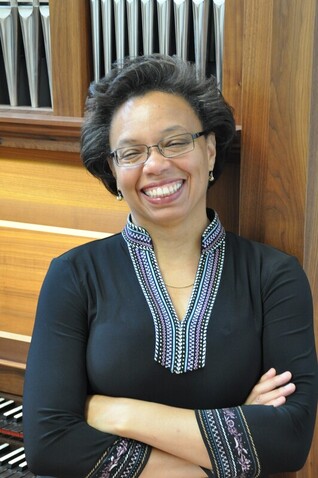
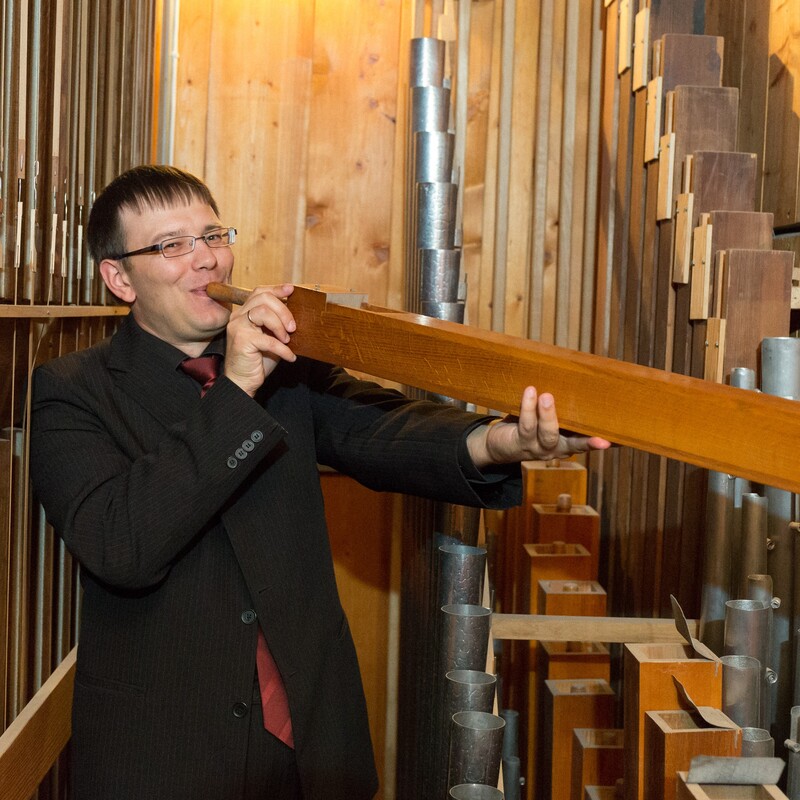
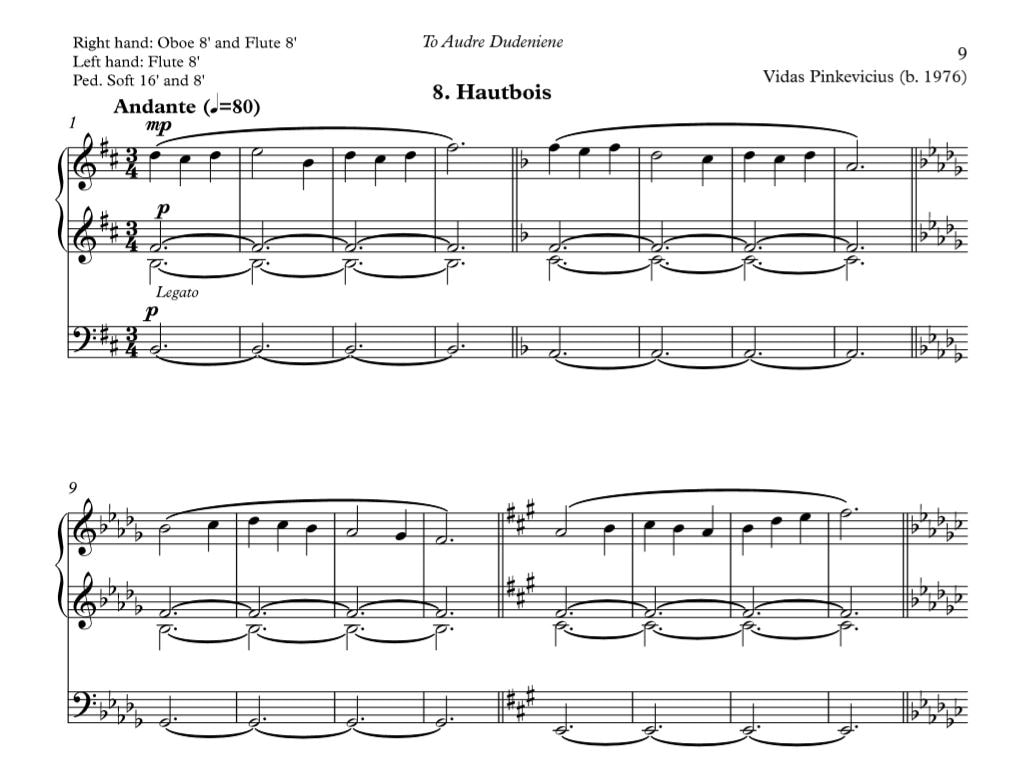
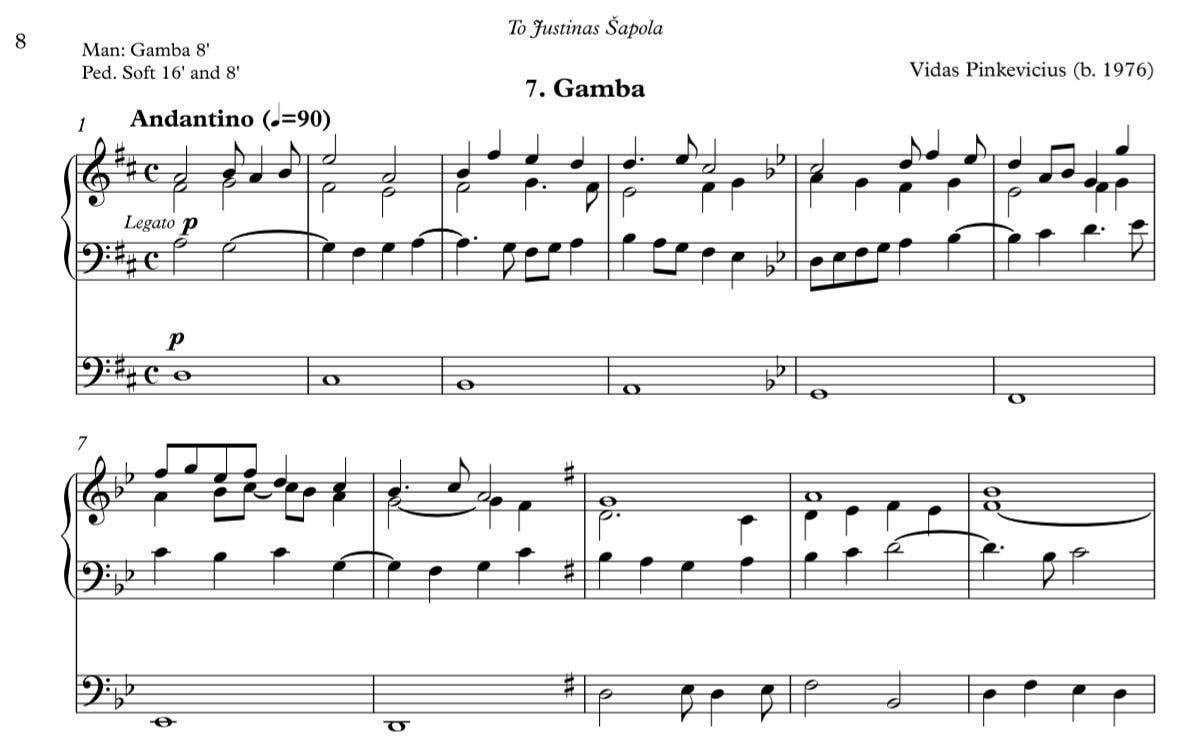
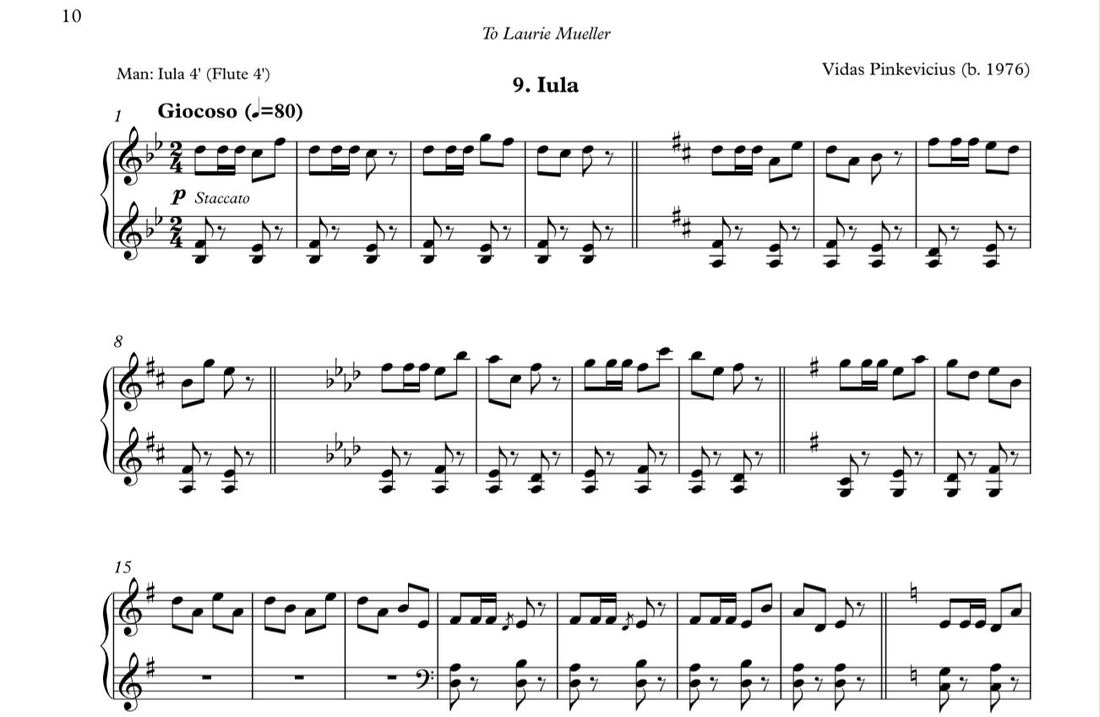
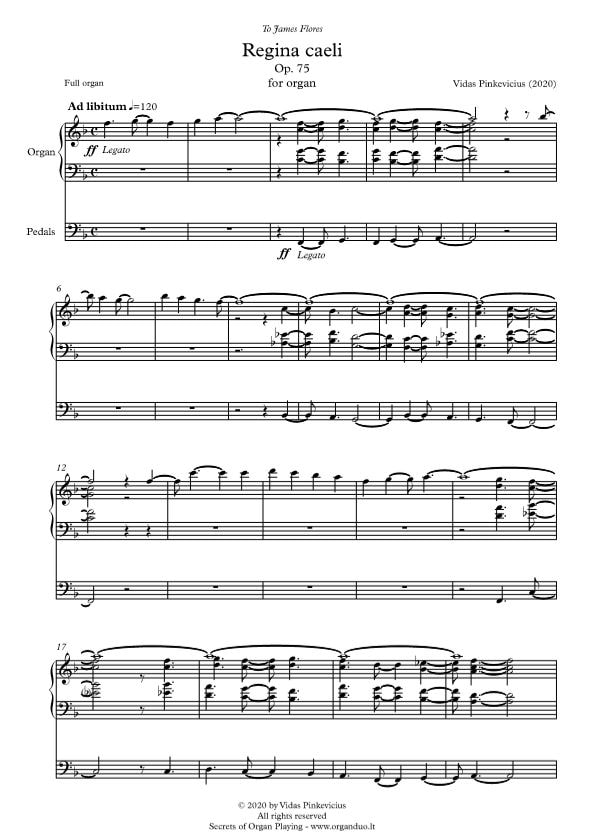
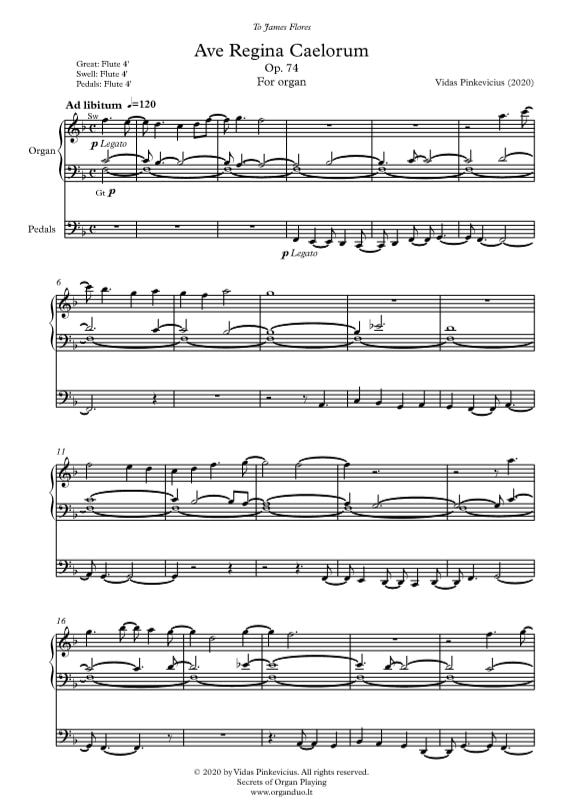



 RSS Feed
RSS Feed